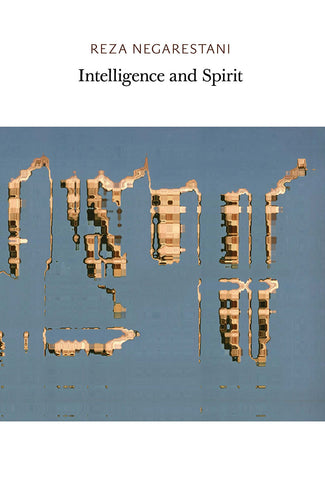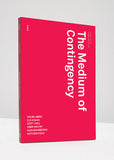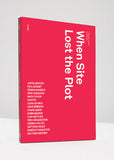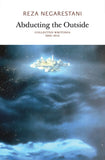Intelligence and Spirit
Intelligence and Spirit
Reza Negarestani
October 2018
Sequence/Urbanomic
Paperback 210x148mm, 592pp.
ISBN 978-0-9975674-0-3
The history of philosophy conceived as the elaboration of a program for artificial general intelligence; intelligence understood as the impersonal and collective evolution of a thought that constructs itself according to a view from nowhere and nowhen.
In Intelligence and Spirit Reza Negarestani formulates the ultimate form of intelligence as a theoretical and practical thought unfettered by the temporal order of things, a real movement capable of overcoming any state of affairs that, from the perspective of the present, may appear to be the complete totality of its history.
Building on Hegel’s account of geist as a multi-agent conception of mind and Kant’s transcendental psychology as a functional analysis of the conditions of possibility of having mind, Negarestani provides a critique of both classical humanism and dominant trends in posthumanism.
This remarkable fusion of continental philosophy in the form of a renewal of the speculative ambitions of German Idealism, and analytic philosophy in the form of extended thought-experiments and a philosophy of artificial languages, opens up new perspectives on the meaning of human intelligence, and explores the real potential of posthuman intelligence and what it means for us to live in its prehistory.
Reza Negarestani is an Iranian philosopher who has contributed extensively to journals and anthologies and lectured at numerous international universities and institutes. He pioneered the genre of ‘theory-fiction’ with his book Cyclonopedia: Complicity with Anonymous Materials (Melbourne: re.press, 2008), going on to develop further conceptual resources for a syncretic philosophy of ‘geotrauma’ or ‘cosmological site of thought’ where the terrestrial conditions of thinking are progressively supplanted and transformed by global cosmological conditions. In continuity with this concern to articulate the local and global and to mitigate local constraints on knowledge, his current philosophical project is focused on rationalist universalism, beginning with the evolution of the modern system of knowledge and advancing toward contemporary philosophies of rationalism, their procedures, and their demands for special forms of human conduct.
Where humanists once reproached idealism for investing thought with a motive force expropriated from human thinkers, posthumanists reduce thinking to a power of prehension exercized by matter.
Intelligence and Spirit subverts both these reductions: it re-invents idealism as a philosophy of intelligence that is also the intelligence of philosophy. Through stunning readings of Kant, Hegel, and especially Plato, Reza Negarestani shows that the freedom proper to the subject and the power proper to the object are unintelligible if separated from the movement of an intelligence that is both unnatured and unnaturing. Just as the function of intelligence cannot be naturalized, the activity of spirit cannot be culturalized. It is spirit that cultivates the union of intelligence and intelligible, without which intelligence as formally conceived is a mere phantasm.
Negarestani’s book is not only an unprecedented amalgam of the programs of Artificial General Intelligence and German Idealism (one he is uniquely equipped to bring about); it advances beyond both metaphysical and postmetaphysical readings of Hegel by showing that spirit can no more be sociologized than it can be substantialised. And in a gesture that identifies the Platonic ascent towards the Good as the ultimate vector of cognitive and political emancipation, Intelligence and Spirit exposes the conservatism common to humanism and posthumanism by showing how it is spirit, not the real or the other, that dissolves every totality and usurps every order.
Ray Brassier
author of Nihil Unbound
A computational process philosophy? A modeling of philosophical Lego? Reza Negarestani’s Intelligence and Spirit is by no means a Neo-Hegelian revival, but a provocative methodological attempt to apply some of Hegel’s critical contentions on reason and spirit to the Kantian epistemological program. The result is a philosophical tour de force that reintroduces Hegel’s Geist to Kant in order to arrive at a neutral conception of intelligence that accommodates AI and future programs of intelligence.
Too often, philosophical treatments of the concept of intelligence willingly sacrifice complex and irreducible notions such as Spirit in favor of physicalistic reductions. In turn, it is rather ubiquitous to find continental philosophers whose account of science and analytic philosophy is either dismissive or lacking in their monocular pursuit of Being. This book is quite different, equally rigorous and difficult but nevertheless playful, it ventures into new territory with some old maps and new models, avoiding the trepidations of Kant’s demarcation of reason, and offering a philosophical grounding to computation.
Adam Berg
Author of Phenomenalism, Phenomenology, and the Question of Time: A Comparative Study of the Theories of Mach, Husserl, and Boltzmann
Contents
Acknowledgements
1. Between Conception and Transformation
It is only what it does; Functions and Multilevel Structural Constraints; Functional Integration: Phases of Geist; Self-Relation: A Function in Progress; Self-Consciousness as Conception and Transformation in an Objective World; A Series of Transformations; History as the Elaboration of What it Means to Be an Artefact of the Concept; A Note on Theory, Mind’s Structuring Function, and Ratiocinating Powers; Selves as Functional Items as Artefacts of Mind; The Sapience Controversy; Rational Integration, Judgment, and Generation of Further Abilities; Historical Awareness as an Essential Constructive and Critical Ability; The Dasein of Geist; The Necessary and Sufficient Links Between Conception and Transformation; Geist at the Edge of Intelligibility
2. An Outside View of Ourselves as Experimental AGI (Problems, Concepts, and Models)
Climbing with Language; Beyond Extreme Scenarios; Hard vs. Soft Parochialism; An Outside View of Ourselves as a Toy Model AGI; Formalizing a Big Toy Universe
3. This I, or We or It, the Thing, Which Speaks (Forms of Intuition)
A Toy Universe of an Embodied Automaton; The Virtuous Circle of Analogy; The Automaton’s Story, a Thought Experiment; Constructing a Lego Model in the Style of Kant’s Threefold Synthesis; A Digression On Modelling Figurative Syntheses; Seeing1 With the Automaton; Getting Stuff In Perspective; The Automaton’s Temporal Perspectival Awareness; Time and Memory
4. Some Unsettling Kantian News, as Delivered by Boltzmann (An Excursion into Time)
Freezing the Flux; Boltzmann’s Copernican Shakedown of the Time-Conscious Subject; Inductive Dogmas and Cognitive Biases of Time-Asymmetry; What Now?; Metaphysics of Time as Logic of Spirit; Time, Reality and The View From Nowhen
5. This I, or We or It, the Thing, Which Speaks (Objectivity and Thought)
Ascent to the Infantile; Infant AGI; As If Raising a Child; Global Pedagogical Project
6. This I, or We or It, the Thing, Which Speaks (Dasein of Geist)
Realization of Language; Pictures, Signs and Symbols; Sign-Vehicles and Symbol-Design; An Acoustic Experiment in the Production of Symbols; Generative Processes and The Hierarchy of Syntactic Complexity; Base Syntactic Abilities
7. This I, or We or It, the Thing, Which Speaks (Language as Interaction as Computation)
The Pragmatic Interface; Enter the Copycat: Interaction as Game as Computation; From Semantics of Interaction to Interaction as the Game of Semantics; Keep it in Focus: A Dialogue in Eight Acts; Formalism and the Pure Autonomy of the Formal; Logic as an Organon and as Worldbuilding; Dogmas of the Experiential; Upward to the Semantic Heavens; Machines Unboxed
8. Philosophy of Intelligence
Datum 1. We Exercise; Datum 2. Philosophy, the Way of Worldbuilding; Datum 3. Actualizing the Possibility of Thinking; Datum 4. Navigating Thought's Ramified Paths; Datum 5. Thought and the Artefact; Datum 6. Philosophy as an Archimedean Lever for Lifting Intelligence and Moving the World; Datum 7. Crafting the Ultimate Form; Datum 8. The Yearning for the Better; Datum 9. Intelligence as Risk and Time; Datum 10. A View from Nowhere and Nowhen, or Philosophy as Intelligence and Time
Appendix: Quandaries of Induction in Philosophy of Knowledge, Philosophy of Mind, and Artificial Intelligence
A Humean Provocation; Uniformity, Regularity, and Memory; The Dissolution of Hume’s Problem and Its Rebirth; Bluffing Your Way Through Simplicity
Bibliography
Index of Names
Index of Subjects
Reza Negarestani:
How to Make Yourself an AGI
Book launch and conversation
with Robin Mackay
Wednesday, November 7, 2018, 7pm
Miguel Abreu Gallery
88 Eldridge Street, 4th Floor, NYC 10002
PRESS RELEASE TRANSCRIPT IMAGES







